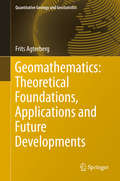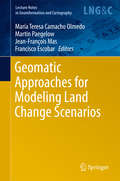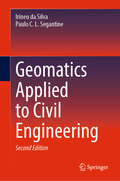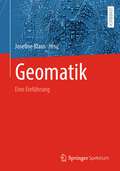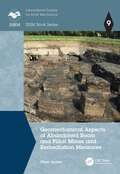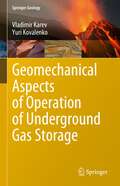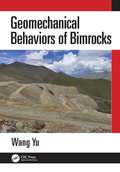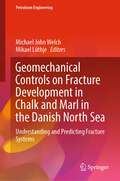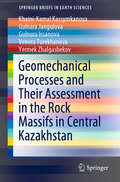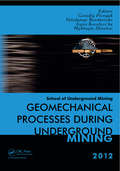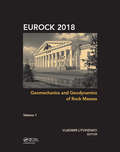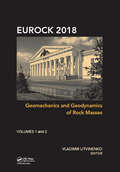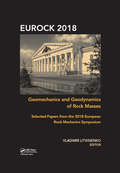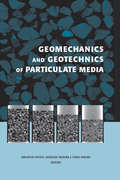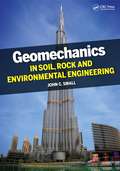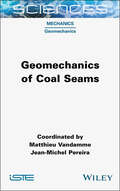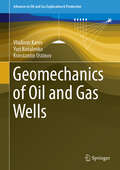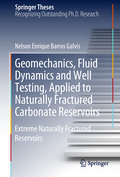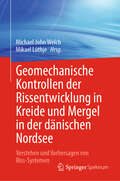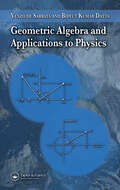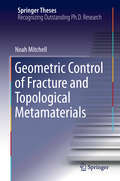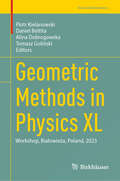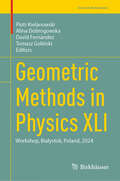- Table View
- List View
Geomathematics: Theoretical Foundations, Applications and Future Developments
by Frits AgterbergThis book provides a wealth of geomathematical case history studies performed by the author during his career at the Ministry of Natural Resources Canada, Geological Survey of Canada (NRCan-GSC). Several of the techniques newly developed by the author and colleagues that are described in this book have become widely adopted, not only for further research by geomathematical colleagues, but by government organizations and industry worldwide. These include Weights-of-Evidence modelling, mineral resource estimation technology, trend surface analysis, automatic stratigraphic correlation and nonlinear geochemical exploration methods. The author has developed maximum likelihood methodology and spline-fitting techniques for the construction of the international numerical geologic timescale. He has introduced the application of new theory of fractals and multi fractals in the geostatistical evaluation of regional mineral resources and ore reserves and to study the spatial distribution of metals in rocks. The book also contains sections deemed important by the author but that have not been widely adopted because they require further research. These include the geometry of preferred orientations of contours and edge effects on maps, time series analysis of Quaternary retreating ice sheet related sedimentary data, estimation of first and last appearances of fossil taxa from frequency distributions of their observed first and last occurrences, tectonic reactivation along pre-existing schistosity planes in fold belts, use of the grouped jackknife method for bias reduction in geometrical extrapolations and new applications of the theory of permanent, volume-independent frequency distributions.
Geomatic Approaches for Modeling Land Change Scenarios
by Francisco Escobar María Teresa Camacho Olmedo Martin Paegelow Jean-François MasThis book provides a detailed overview of the concepts, techniques, applications, and methodological approaches involved in land use and cover change (LUCC) modeling, also known simply as land change modeling. More than 40 international experts in this field have participated in this book, which illustrates recent advances in LUCC modeling with examples from North and South America, the Middle East, and Europe. Given the broad range of geomatic approaches available, it helps readers select the approach that best meets their needs. The book is structured into five parts preceded by a foreword written by Roger White and a general introduction. Part I consists of four chapters, each of which focuses on a specific stage in the modeling process: calibration, simulation, validation, and scenarios. It presents and explains the fundamental ideas and concepts underlying LUCC modeling. This is complemented by a comparative analysis of the selected software packages, practically applied in various case studies in Part II and Part III. Part II discusses recently proposed methodological developments that have enhanced modeling procedures and results while Part III offers case studies as well as interesting, innovative methodological proposals. Part IV revises different fundamental techniques used in LUCC modeling and finally Part V describes the best-known software packages used in the applications presented in Parts II and III.
Geomatics Applied to Civil Engineering
by Irineu da Silva Paulo C. SegantineThis textbook deals jointly with theoretical and practical concepts within geomatics in civil engineering, based on the global understanding of its use. Written by civil engineers with professional backgrounds in geomatics, the book has a number of unique characteristics, including analysis of geodetic references and their coordinate systems to allow their conversions and applications taking into account the local topographic plan; analysis of the measurements of directions, angles and distances, inserting them into the concepts of practical use of modern measuring instruments; detailed description of the main components of measurement instruments used in geomatics; discussion of instrumentation errors and their implications; and a complete study of UTM Projection System and its variants, equations, and practical application in civil engineering projects. For students and instructors, and practitioners, the subjects covered in the book are organized to cover most topics related to the disciplines of surveying or geomatics studied in civil engineering courses. It is entirely based on adjustment computation for spatial data analysis including coordinate geometry and traverse computation. To this end, an entire chapter is devoted to adjustment computation based on matrix theory to help readers understand its applications in spatial data analysis throughout the book’s chapters; including chapters on modern technologies such as conventional and UAV-based digital photogrammetry, digital terrain modelling, terrestrial laser scanning and BIM.
Geomatik: Eine Einführung
by Josefine KlausWas ist eine Mercatorabbildung? Wie berechnet man Koordinaten? Wie funktioniert ein Geoinformationssystem? Diese und viele weitere Fragen beantwortet „Geomatik - Eine Einführung“ und bietet damit zum ersten Mal die theoretischen Grundlagen der Ausbildung zur/zum Geomatiker:in in einem Werk.Folgende Themen werden auf der Grundlage des bundesweit einheitlichen Rahmenlehrplans der Berufsausbildung behandelt:Organisation des Vermessungswesen Erfassung, Bearbeitung und Präsentation von Geodaten Verwaltung von GeodatenGrundlagen des Web- und Printdesigns Selbstständige Entwicklung von GeoproduktenDie Inhalte werden ergänzt durch ein auf die Prüfungen angepasstes Lernangebot und zahlreiche weiterführende Informationsquellen. Dadurch entsteht ein umfassendes und zeitgemäßes Handbuch für den Berufsschulunterricht und zur Prüfungsvorbereitung im Bereich der Geoinformatik, Vermessung und Kartographie. Aus einer modernen, digitalen Wissensvermittlung sind die visuellen und kartenbasierten Ansätze der Geomatik nicht mehr wegzudenken. Die in diesem Buch angebotenen Informationen ermöglichen es angehenden Geomatiker:innen und Interessierten selbstständig eigene Geoprodukte zu erstellen.
Geomechanical Aspects of Abandoned Room and Pillar Mines and Remediation Measures (ISRM Book Series)
by Ömer AydanGeomechanical Aspects of Abandoned Room and Pillar Mines and Remediation Measures addresses the occurrence, prediction, and control of subsidence issues encountered in room and pillar mining, including creep, degradation, and seismic aspects. The book distinguishes itself by: Presenting a unified treatise on room and pillar mines Using clear definitions and explanations of fundamental concepts Considering long-term aspects (creep and degradation), seismic effects, remedial measures, contact types, and remote sensing monitoring techniques Including physical and numerical modeling Demonstrating an in-depth view of procedures and solution techniques This book provides a clear understanding of active and/or abandoned room and pillar mines. It is aimed at academics and engineers with a mining and/or civil engineering background, but it also serves as a reference for undergraduate and graduate students.
Geomechanical Aspects of Operation of Underground Gas Storage (Springer Geology)
by Vladimir Karev Yuri KovalenkoThis book is devoted to the most important and urgent problems arising during the operation of underground gas storage facilities (UGS) and associated with the destruction of the reservoir and sand production into the wells. UGS facilities play a special role in ensuring high reliability of stable and guaranteed gas supplies to consumers. However, despite many years of experience in UGS well operation, there is still no sufficiently substantiated geomechanical model of reservoir failure and a mathematical description of the processes occurring in the reservoir-well system, taking into account the peculiarities of the mechanical behavior of reservoir rocks during cyclic injection and extraction of gas. As a result, there are no reliable criteria for establishing a rational regime for the operation of an UGS wells in conditions of a possible destruction of reservoir rocks. Further development of underground gas storage direction requires the introduction of innovative technologies that can be used both in the design of new UGS facilities and to extend the safe and efficient operation of existing underground gas storage facilities. To solve these problems, the most promising technologies, taking into account their efficiency, relatively low cost and environmental safety, are those based on the geomechanical approach.The book is addressed to specialists in the development and operation of underground gas storage facilities, as well as specialists in geomechanics of oil and gas fields. It can be useful for students and graduate students studying in the speciality "Development of oil and gas fields".
Geomechanical Behaviors of Bimrocks
by Wang YuThis book is intended as a reference book for advanced graduate students and research engineers in block-in-matrix rocks (bimrocks) or soil and rock mixtures (SRMs) or rock and soil aggregate (RSA). Bimrocks are complex formations characterized by competent rock inclusions floating in a weaker matrix. Typical types of bimrocks include a series of mixed geological or engineering masses such as mélanges, fault rocks, coarse pyroclastic rocks, breccias, sheared serpentines, and waste dump mixture. Bimrock is especially different from the general soil and rock material, and the detection of the damage and fracture is still wide open to innovative research. Globally, there is a widespread interest in investigating the geomechanical behaviors of bimrocks, such as deformation and strength characteristics, damage and fracture evolution, and stability prediction of bimrock construction. However, the meso-structural factors control the whole mechanical properties of bimrocks; the source of the macroscopic deformation phenomenon is the meso-structural changes. Therefore, evaluation of the mesoscopic physical and mechanical properties, together with advanced testing technique, is an attractive research topic in rock mechanics. As a result, comprehensive macroscopic and mesoscopic experimental investigations should be conducted to reveal the damage and fracturing mechanical behaviors of bimrocks. The readers of this work can gain new insights into the meso-structural changes of bimrocks subjected to different stress paths. This book is expected to improve the understanding of the mesoscopic damage and fracturing mechanisms of bimrocks, and can be helpful to predict the stability of rock structures where rock mass is subjected to complex loading conditions.
Geomechanical Controls on Fracture Development in Chalk and Marl in the Danish North Sea: Understanding and Predicting Fracture Systems (Petroleum Engineering)
by Michael John Welch Mikael LüthjeThis book summarizes new discoveries on fracturing in chalk. Based on studies on the Danish North Sea, this book shows how observations from outcrop analogues, core and seismic data can be used to characterize the density, distribution and geometry of natural fractures in chalk and marl. Laboratory experiments on chalk samples reveal the controls on the geomechanical properties of chalk and thus on the growth of natural fractures. Finally, various modeling techniques are employed to investigate the mechanical deformation in the chalk structures of the Danish North Sea and to predict fracture distribution and geometry in the subsurface. An understanding of fracture density, distribution and geometry is essential for planning efficient fluid extraction or injection strategies and CO2 sequestration. This book provides the necessary knowledge.
Geomechanical Processes and Their Assessment in the Rock Massifs in Central Kazakhstan (SpringerBriefs in Earth Sciences)
by Gulnura Issanova Khaini-Kamal Kassymkanova Gulnara Jangulova Venera Turekhanova Yermek ZhalgasbekovThis book focuses on the mineral deposits from the mining complex of Kazakhstan, including copper ores from the Nikolayevsky and Shemonaikhinsky open-pit quarries, and from the Kazchrome and Konyrat mines in Balkhash. This study assesses the geomechanical conditions of the rock massive, as well as strengthening and reinforcing processes. It develops methods for their assessment and provides detailed instructions on applying the methods. The book also summarizes the latest research and developments in formulating cement solutions to reinforce slopes and suppress dust on the roads of the quarry. The book’s overarching goal is to promote geological and mining engineering conditions that ensure the ecologically safe development of the mineral resource fields. Given its scope, the book will be of interest to mining engineers, researchers, and students in a broad range of geomechanical, geodesic, mining and environmental fields.
Geomechanical Processes during Underground Mining: School of Underground Mining 2012
by Genadiy Pivnyak Volodymyr Bondarenko Iryna Kovalevs'Ka Mykhaylo IlliashovThis volume deals with economic aspects of mining companies development strategies, various mineral deposits development techniques, imitational modeling of mine workings with rock massif, methane extraction technologies during coal mining, geomechanical processes during plow mining, mining transport importance for mineral extraction, massif
Geomechanics and Geodynamics of Rock Masses, Volume 1: Proceedings of the 2018 European Rock Mechanics Symposium
by Vladimir LitvinenkoThis book is Volume 1 of the EUROCK 2018 proceedings. Geomechanics and Geodynamics of Rock Masses contains contributions presented at EUROCK 2018, the 2018 International Symposium of the International Society for Rock Mechanics (ISRM 2018, Saint Petersburg, Russia, 22-26 May 2018). Dedicated to recent advances and achievements in the fields of geomechanics and geotechnology, the main topics of the book include:- Physical and mechanical properties of fractured rock (laboratory testing and rock properties, field measurements and site investigations)- Geophysics in rock mechanics- Rock mass strength and failure- Nonlinear problems in rock mechanics- Effect of joint water on the behavior of rock foundation- Numerical modeling and back analysis- Mineral resources development: methods and rock mechanics problems- Rock mechanics and underground construction in mining, hydropower industry and civil engineering- Rock mechanics in petroleum engineering- Geodynamics and monitoring of rock mass behavior- Risks and hazards- Geomechanics of technogenic depositsGeomechanics and Geodynamics of Rock Masses will be of interest to researchers and professionals involved in the various branches of rock mechanics and rock engineering. EUROCK 2018, organized by the Saint Petersburg Mining University, is a continuation of the successful series of ISRM symposia in Europe, which began in 1992 in Chester, UK.
Geomechanics and Geodynamics of Rock Masses: Proceedings of the 2018 European Rock Mechanics Symposium
by Vladimir LitvinenkoGeomechanics and Geodynamics of Rock Masses contains contributions presented at EUROCK 2018, the 2018 International Symposium of the International Society for Rock Mechanics (ISRM 2018, Saint Petersburg, Russia, 22-26 May 2018). Dedicated to recent advances and achievements in the fields of geomechanics and geotechnology, the main topics of the book include: - Physical and mechanical properties of fractured rock (laboratory testing and rock properties, field measurements and site investigations)- Geophysics in rock mechanics- Rock mass strength and failure- Nonlinear problems in rock mechanics- Effect of joint water on the behavior of rock foundation- Numerical modeling and back analysis- Mineral resources development: methods and rock mechanics problems- Rock mechanics and underground construction in mining, hydropower industry and civil engineering- Rock mechanics in petroleum engineering- Geodynamics and monitoring of rock mass behavior- Risks and hazards- Geomechanics of technogenic deposits Geomechanics and Geodynamics of Rock Masses will be of interest to researchers and professionals involved in the various branches of rock mechanics and rock engineering. EUROCK 2018, organized by the Saint Petersburg Mining University, is a continuation of the successful series of ISRM symposia in Europe, which began in 1992 in Chester, UK.
Geomechanics and Geodynamics of Rock Masses: Selected Papers from the 2018 European Rock Mechanics Symposium
by Vladimir LitvinenkoGeomechanics and Geodynamics of Rock Masses – Selected Papers contains selected contributions from EUROCK 2018, the 2018 International Symposium of the International Society for Rock Mechanics (ISRM 2018, Saint Petersburg, Russia, 22—26 May 2018). Dedicated to recent advances and achievements in the fields of geomechanics and geotechnology, the book will be of interest to researchers and professionals involved in the various branches of rock mechanics and rock engineering. EUROCK 2018, organized by the Saint Petersburg Mining University, is a continuation of the successful series of ISRM symposia in Europe, which began in 1992 in Chester, UK.
Geomechanics and Geotechnics of Particulate Media: Proceedings of the International Symposium on Geomechanics and Geotechnics of Particulate Media, Ube, Japan, 12-14 September 2006
by Masayuki Hyodo Hidekazu Murata Yukio NakataMicroscopic re-examination of geomaterials consisting of aggregates can shed light on macroscopic behaviour, including compressibility, anisotropy, yielding, creep, cyclic liquefaction and shear rupture. As a result of this process of examination, new methods of material characterization emerge, leading to a greater degree of accuracy in the specification of new constitutive models with physically-meaningful parameters. The impetus behind this development is an increasing awareness on sustainability, leading to the more efficient use of recycled materials for geotechnical applications. The characteristics of recycled materials, such as compressibility and self-hardening, may differ significantly from those of natural materials, and it is crucial that evaluation is made from a specifically particulate perspective.
Geomechanics in Soil, Rock, and Environmental Engineering
by John SmallUtilizes both Computer- and Hand-Based Calculations… Modern practice in geomechanics is becoming increasingly reliant on computer-based software, much of which can be obtained through the Internet. In Geomechanics in Soil, Rock, and Environmental Engineering the application of these numerical techniques is examined not only for soil mechanics, but also for rock mechanics and environmental applications. … For Use in Complex Analysis It deals with the modern analysis of shallow foundations, deep foundations, retaining structures, and excavation and tunneling. In recent years, the environment has become more and more important, and so it also deals with municipal and mining waste and solutions for the disposal and containment of the waste. Many fresh solutions to problems are presented to enable more accurate and advanced designs to be carried out. A Practical Reference for Industry Professionals, This Illuminating Book: Offers a broad range of coverage in soil mechanics, rock mechanics, and environmental engineering Incorporates the author‘s more than 40 years of academic and practical design experience Describes the latest applications that have emerged in the last ten years Supplies references readily available online for futher research Geomechanics in Soil, Rock, and Environmental Engineering should appeal to students in their final undergraduate course in geomechanics or master’s students, and should also serve as a useful reference to practitioners in the field of geomechanics, reflecting the author’s background in both industry and academia.
Geomechanics of Coal Seams (ISTE Invoiced)
by Jean-Michel Pereira Matthieu VandammeGeomechanics of Coal Seams explores the evolving role of coal, transitioning from a historically criticized energy source tied to the Industrial Revolution, to a material with the potential to play a significant role in achieving net-zero greenhouse gas emissions. Traditionally used as raw material, coal now serves as a reservoir for natural gas or carbon dioxide storage, offering a path toward reducing global greenhouse gas emissions. Despite its promise, challenges remain, particularly regarding its geomechanical behavior. This book delves into the unique properties of coal, covering everything from geological foundations to numerical modeling. Aimed at students, researchers, and engineers, the book provides valuable insights applicable to other microporous materials.
Geomechanics of Oil and Gas Wells (Advances in Oil and Gas Exploration & Production)
by Vladimir Karev Yuri Kovalenko Konstantin UstinovThe book presents an integrated approach to studying the geomechanical processes occurring in oil and gas-bearing formations during their development. It discusses the choice of a model that takes into account the basic properties of rocks; experiments to find model parameters; numerical modeling; and direct physical modeling of deformation and filtration processes in reservoir and host rocks. Taking into account features of rock behavior, such as anisotropy of the mechanical properties of rocks during elastoplastic deformation; dependence of permeability on the total stress tensor; the contribution of the filtration flow to the formation stress state; and the influence of tangential as well as normal stresses on the transition to inelastic deformation, it demonstrates how the presented approach allows the practical problems of increasing the productivity of wells, oil recovery, and ensuring the stability of wellbores to be solved.The book is intended for specialists, including geoengineers working in the oil and gas sector, teachers, graduate students and students, as well as all those interested in scientific and technological developments to meet the enormous demand for raw materials and energy.
Geomechanics, Fluid Dynamics and Well Testing, Applied to Naturally Fractured Carbonate Reservoirs
by Nelson Enrique Barros GalvisThis thesis presents an important step towards a deeper understanding of naturally fractured carbonate reservoirs (NFCRs). It demonstrates the various kinds of discontinuities using geological evidence, mathematical kinematics model and computed tomography and uses this as a basis for proposing a new classification for NFCRs. Additionally, this study takes advantage of rock mechanics theory to illustrate how natural fractures can collapse due to fluid flow and pressure changes in the fractured media. The explanations and mathematical modeling developed in this dissertation can be used as diagnostic tools to predict fluid velocity, fluid flow, tectonic fracture collapse, pressure behavior during reservoir depleting, considering stress-sensitive and non-stress-sensitive, with nonlinear terms in the diffusivity equation applied to NFCRs. Furthermore, the book presents the description of real reservoirs with their field data as the principal goal in the mathematical description of the realistic phenomenology of NFCRs.
Geomechanische Kontrollen der Rissentwicklung in Kreide und Mergel in der dänischen Nordsee: Verstehen und Vorhersagen von Riss-Systemen
by Michael John Welch Mikael LüthjeDieses Buch fasst neue Entdeckungen zur Rissbildung in Kreide zusammen. Basierend auf Studien in der dänischen Nordsee zeigt das Buch, wie Beobachtungen von Aufschlussanaloga, Bohrkernen und seismischen Daten genutzt werden können, um die Dichte, Verteilung und Geometrie natürlicher Risse in Kreide und Mergel zu charakterisieren. Laborversuche mit Kreideproben zeigen die Einflussfaktoren auf die geomechanischen Eigenschaften der Kreide und damit auf das Wachstum natürlicher Risse. Schließlich werden verschiedene Modellierungstechniken eingesetzt, um die mechanische Deformation in den Kreide-Strukturen der dänischen Nordsee zu untersuchen und die Rissverteilung sowie -geometrie im Untergrund vorherzusagen. Ein Verständnis der Rissdichte, -verteilung und -geometrie ist entscheidend für die Planung effizienter Strategien zur Fluidextraktion oder -injektion sowie zur CO2-Speicherung. Dieses Buch liefert das notwendige Wissen.
Geometric Algebra and Applications to Physics
by Venzo de Sabbata Bidyut Kumar DattaBringing geometric algebra to the mainstream of physics pedagogy, Geometric Algebra and Applications to Physics not only presents geometric algebra as a discipline within mathematical physics, but the book also shows how geometric algebra can be applied to numerous fundamental problems in physics, especially in experimental situations. This
Geometric Algebra for Physicists
by Chris Doran Anthony LasenbyGeometric algebra is a powerful mathematical language with applications across a range of subjects in physics and engineering. This book is a complete guide to the current state of the subject with early chapters providing a self-contained introduction to geometric algebra. Topics covered include new techniques for handling rotations in arbitrary dimensions, and the links between rotations, bivectors and the structure of the Lie groups. Following chapters extend the concept of a complex analytic function theory to arbitrary dimensions, with applications in quantum theory and electromagnetism. Later chapters cover advanced topics such as non-Euclidean geometry, quantum entanglement, and gauge theories. Applications such as black holes and cosmic strings are also explored. It can be used as a graduate text for courses on the physical applications of geometric algebra and is also suitable for researchers working in the fields of relativity and quantum theory.
Geometric Control of Fracture and Topological Metamaterials (Springer Theses)
by Noah MitchellThis thesis reports a rare combination of experiment and theory on the role of geometry in materials science. It is built on two significant findings: that curvature can be used to guide crack paths in a predictive way, and that protected topological order can exist in amorphous materials. In each, the underlying geometry controls the elastic behavior of quasi-2D materials, enabling the control of crack propagation in elastic sheets and the control of unidirectional waves traveling at the boundary of metamaterials. The thesis examines the consequences of this geometric control in a range of materials spanning many orders of magnitude in length scale, from amorphous macroscopic networks and elastic continua to nanoscale lattices.
Geometric Invariant Theory, Holomorphic Vector Bundles and the Harder-Narasimhan Filtration (SpringerBriefs in Mathematics)
by Alfonso Zamora Saiz Ronald A. Zúñiga-RojasThis book introduces key topics on Geometric Invariant Theory, a technique to obtaining quotients in algebraic geometry with a good set of properties, through various examples. It starts from the classical Hilbert classification of binary forms, advancing to the construction of the moduli space of semistable holomorphic vector bundles, and to Hitchin’s theory on Higgs bundles. The relationship between the notion of stability between algebraic, differential and symplectic geometry settings is also covered.Unstable objects in moduli problems -- a result of the construction of moduli spaces -- get specific attention in this work. The notion of the Harder-Narasimhan filtration as a tool to handle them, and its relationship with GIT quotients, provide instigating new calculations in several problems. Applications include a survey of research results on correspondences between Harder-Narasimhan filtrations with the GIT picture and stratifications of the moduli space of Higgs bundles.Graduate students and researchers who want to approach Geometric Invariant Theory in moduli constructions can greatly benefit from this reading, whose key prerequisites are general courses on algebraic geometry and differential geometry.
Geometric Methods in Physics XL: Workshop, Białowieża, Poland, 2023 (Trends in Mathematics)
by Piotr Kielanowski Daniel Beltita Alina Dobrogowska Tomasz GolińskiThis volume collects papers based on lectures given at the XL Workshop on Geometric Methods in Physics, held in Białowieża, Poland in July 2023. These chapters provide readers an overview of cutting-edge research in infinite-dimensional groups, integrable systems, quantum groups, Lie algebras and their generalizations and a wide variety of other areas. Specific topics include: Yang-Baxter equation The restricted Siegel disc and restricted Grassmannian Geometric and deformation quantization Degenerate integrability Lie algebroids and groupoids Skew braces Geometric Methods in Physics XL will be a valuable resource for mathematicians and physicists interested in recent developments at the intersection of these areas.
Geometric Methods in Physics XLI: Workshop, Białystok, Poland, 2024 (Trends in Mathematics)
by Piotr Kielanowski Alina Dobrogowska Tomasz Goliński David FernándezThis volume collects papers based on lectures given at the XLI Workshop on Geometric Methods in Physics, held in Białystok, Poland in July 2024 as well as extended abstracts of minicourses presented during the XIII School on Geometry and Physics. These chapters provide readers an overview of cutting-edge research in quantum field theories, infinite-dimensional groups, integrable systems, noncommutative geometry, and a wide variety of other areas. Specific topics include:• Graded structures• Lie algebra structures• Quasicrystals• Sigma models• Barycentric algebras• Nijenhuis geometryGeometric Methods in Physics XLI will be a valuable resource for mathematicians and physicists interested in recent developments at the intersection of these areas.
